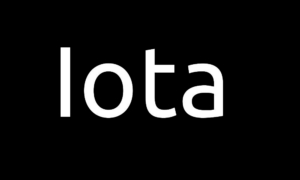 Introducing Iota School
Introducing Iota School
This post was originally shared in newsletter form. To receive updates on Patrick’s work on Iota School, along with some thoughts on humanities entrepreneurship and building infrastructure to better serve the public, subscribe to the Techne newsletter.
So, Who Are You?
I’m Patrick Smyth, the new postdoc in Humanities Entrepreneurship at the Publics Lab. 👋 I graduated with a PhD in English from the CUNY Graduate Center in June, and for the last few years I’ve been coordinating a program at Columbia University teaching technical skills to researchers. I like teaching people, especially but not exclusively humanists, to do things with computers. I’m motivated by the idea that, if we as scholars don’t build for ourselves, then others (especially corporations) will interpose themselves between our work and the public.
While a postdoc at the Publics Lab, and hopefully beyond, I’ll be creating a business, Iota School, to teach technical skills to humanists and the humanities-aligned. This post introduces my vision for Iota School, the postdoc, and the Techne newsletter. Feel free to check out the website or sign up for the newsletter, with the caveat that much on the site is currently still nonfunctional—I’m aiming to build it in public, with all the attendant embarrassments and 404 errors.
The Short Version
So, this year I’ve taken on a postdoctorate in Humanities Entrepreneurship with the Publics Lab at The Graduate Center, CUNY. While there, I get to work with great people like director Stacy Hartman and two cohorts of Public Fellows, all of whom are working in important areas related to academic engagement with the public.
Excitingly, and kind of remarkably, I’ll be taking much of my time with the Publics Lab to work on a humanities-oriented business, Iota School. Iota School, which I will sometimes shorten to Iota, will offer accessible technical training based on a modular curriculum to researchers in the humanities and to GLAM (Galleries, Libraries, Archives, and Museums) professionals.
That’s the short version. For the longer version, I’ll start with what I’ve learned about how researchers, and especially humanists, learn technical skills, and why I think there’s space out there for something like Iota.
Things I’ve Learned
For the past seven years or so, while working with Graduate Center Digital Initiatives, the Digital Humanities Summer Institute, and the Foundations for Research Computing program at Columbia, I’ve taught researchers, often but not always humanists, how to study, do, and build with computers, and in particular using skills such as the Python and R programming languages, the UNIX command line, and HTML/CSS. During that time, I’ve learned…
- …that researchers, including humanists and humanistic social scientists, rely on a lot of infrastructure to do research and share their work.
- …that leaving the creation of that infrastructure to others, like hired staff or giant corporations, leads to a lot of problems.
- …that there are a limited number of places to turn to learn technical skills as a researcher.
- …that there’s a demand for technical training for researchers and practitioners in the humanities, humanistic social sciences, and GLAM (Galleries, Libraries, Archives, and Museums).
- …that humanists, qualitative social scientists, and GLAM folks have preferred ways of learning technical skills.
In future posts, I’ll unpack some of these observations, none of which are universally true and all of which can be qualified in various ways. There are also amazing people, many of them my friends and colleagues, working to bridge these gaps every day. And, of course, not everyone wants or needs these approaches or skills. But my thesis, and the motivation for Iota, is that there is space, and a need, for accessible technical curriculum and organized training for humanists and the GLAMorous.
Introducing Iota School
Iota School will be a business, a curriculum, and a platform serving humanists in need of accessible technical training. Curriculum will be designed in small units, “iotas,” that can be organized and reorganized into sequences. These could include a one-hour demonstration, a two-hour workshop, a day-long intensive, a week-long institute, a months-long course, or a years-long self-inquiry. Initial offerings for training will include technical fundamentals such as the command line and Python, but will also approach specific areas of interest to humanists and qualitative social scientists. These will be developed in cooperation with partners working in those domains.
Curriculum will be released under a Creative Commons Attribution-Noncommercial 3.0 License. That is, the materials can be freely used for any noncommercial purpose and even modified, built on, or remixed, but attribution will need to be provided. For reasons that I’ll get into in future posts, I don’t think releasing materials under Creative Commons is incompatible with Iota’s status as a business, and this means Iota will create something of public use and benefit.
The platform (and I use that term with some hesitation) will be a web application designed to facilitate the creation of accessible curriculum, and will itself be malleable and modifiable in ways that, I hope, will model a vision for infrastructure that reflects humanistic values. The plan is to allow users of the platform an unusual level of introspection and control. Ideally, the platform will itself serve as a technical text, and accessing its functionality through an API examining its database schema could be part of the curriculum.
First Offerings
I have loose plans for initial training that will be offered by Iota. Likely first candidates would be an intensive on the Python programming language, tentatively conceptualized as Introspective Python and with an emphasis on conversing with the machine in ways that build specific kinds of understanding, and a more domain-specific offering that I’ll discuss later. If you have ideas on something you’d really like to see, reach out to patrick@iotaschool.com.
The Techne Newsletter
Broadly, the idea is for Techne to be both part of and a little separate from Iota, and for it to be a place where I explore some of the larger themes and interests that made me want to start Iota in the first place. These include building and studying infrastructure, finding ways to live in a world that constrains and restrains, and broadening our idea of what technology is and does. I’m pretty weird, mostly blind, and not particularly self-serious, so you’ll also see odd tangents, personal thoughts, and jokes and dry humor. (Just trying to give you a sense of what’s coming so you can make an educated decision about subscribing.)
Looking Forward
I’m excited to see what happens this year with Iota School, and to try many things to see what works and what doesn’t. Either way, I’ll be sharing what happens, and building the platform and the curriculum in public. Thank you, and much joy in creation to you all.

 Introducing Iota School
Introducing Iota School





